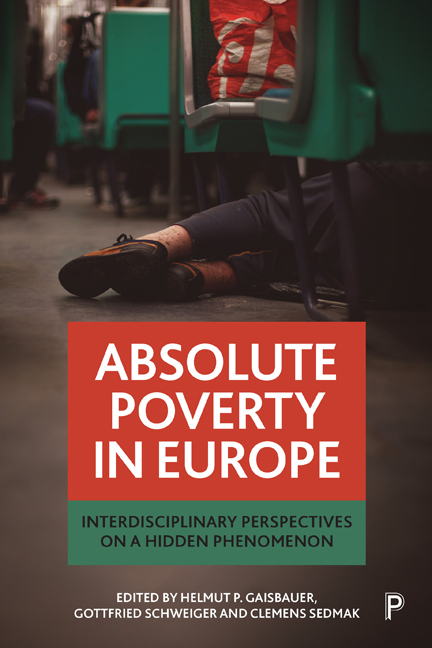Book contents
- Frontmatter
- Contents
- List of figures and tables
- Notes on contributors
- 1 Absolute poverty in Europe: introduction
- Part One Conceptual and methodological challenges
- Part Two Key issues for the absolute poor
- Part Three Policy responses to absolute poverty in Europe
- Part Four Ethical perspectives on absolute poverty in Europe
- Conclusion responding to the dark reality of absolute poverty in European welfare states
- Index
5 - Measuring absolute poverty: shame is all you need
Published online by Cambridge University Press: 27 April 2022
- Frontmatter
- Contents
- List of figures and tables
- Notes on contributors
- 1 Absolute poverty in Europe: introduction
- Part One Conceptual and methodological challenges
- Part Two Key issues for the absolute poor
- Part Three Policy responses to absolute poverty in Europe
- Part Four Ethical perspectives on absolute poverty in Europe
- Conclusion responding to the dark reality of absolute poverty in European welfare states
- Index
Summary
Introduction
Each generation asks the same questions. Often, they yield the same answers. But sometimes they do not.
‘What is poverty?’ and ‘Is it absolute or relative?’ are a couple of the questions that people keep asking. By the 1960s, it was generally agreed in Europe that poverty is inherently relative. But Americans kept insisting on using a measure that was fairly absolute. (Microsoft's grammar checker points out that ‘fairly absolute’ is a nonsense [since absolute is non-gradable] but the Orshanski measure used in the US is just that [US Census, 2017].) Maybe Americans clung to an absolute measure because in many US policy circles socialism is largely a term of abuse while a simplistic understanding of relative poverty might point to policy responses requiring substantial income redistribution and big government; ergo, socialism.
Looking to the Global South, where poverty in the 1960s manifested as a truly life or death matter, there was much less confidence that poverty had to be relative and little agreement about what to do about it however it was measured. However, with the role of government denigrated during the era of the Washington Consensus (circa 1980–2008), measuring poverty seemed superfluous since market-driven growth would eradicate poverty, making measurement redundant (Surender, 2014). When that didn't happen and the Consensus cracked, the World Bank promoted a measure, less absolute than arbitrary, to be used in the developing world. Initially fixed at $1/day, the measure was in 1990 sufficiently low to avoid accusations that doing something about it smacked of socialism, while simultaneously implying that people blessed with an additional cent were, if not rich, not poor (World Bank, 1990).
Later people began to listen to Amartya Sen, economist and Nobel laureate, perhaps because he was an economist and Nobel laureate; certainly, it could not have been because he expressed his ideas clearly. What he seemed to say was that poverty was both relative and absolute, that it was possible to have a poverty cake and eat it. Moreover, he willingly offered the policy world several metrics including the Human Development Index (HDI) and Human Poverty Index (HPI); these were simple, cheap, functional and policy-focused indicators that enthusiasts willingly called measures of poverty (although they were better as indicators of wellbeing).
- Type
- Chapter
- Information
- Absolute Poverty in EuropeInterdisciplinary Perspectives on a Hidden Phenomenon, pp. 97 - 118Publisher: Bristol University PressPrint publication year: 2019



